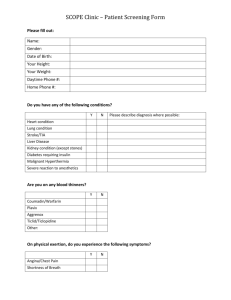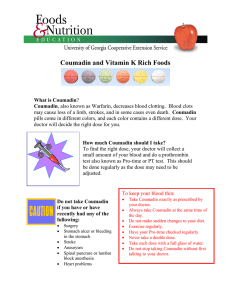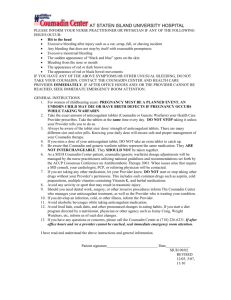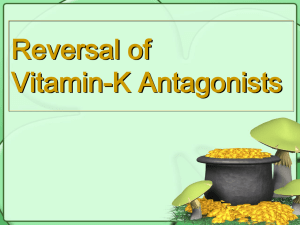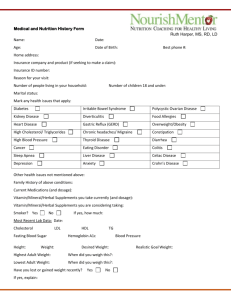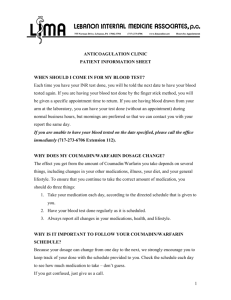Coumadin Diet
advertisement
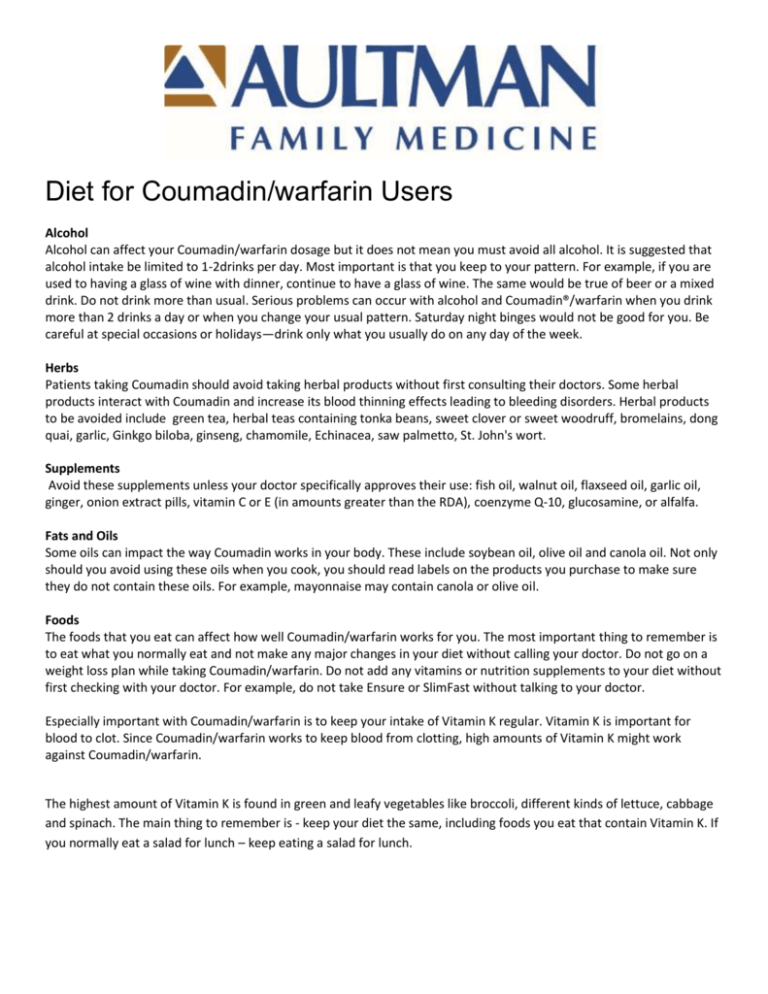
Diet for Coumadin/warfarin Users Alcohol Alcohol can affect your Coumadin/warfarin dosage but it does not mean you must avoid all alcohol. It is suggested that alcohol intake be limited to 1-2drinks per day. Most important is that you keep to your pattern. For example, if you are used to having a glass of wine with dinner, continue to have a glass of wine. The same would be true of beer or a mixed drink. Do not drink more than usual. Serious problems can occur with alcohol and Coumadin®/warfarin when you drink more than 2 drinks a day or when you change your usual pattern. Saturday night binges would not be good for you. Be careful at special occasions or holidays—drink only what you usually do on any day of the week. Herbs Patients taking Coumadin should avoid taking herbal products without first consulting their doctors. Some herbal products interact with Coumadin and increase its blood thinning effects leading to bleeding disorders. Herbal products to be avoided include green tea, herbal teas containing tonka beans, sweet clover or sweet woodruff, bromelains, dong quai, garlic, Ginkgo biloba, ginseng, chamomile, Echinacea, saw palmetto, St. John's wort. Supplements Avoid these supplements unless your doctor specifically approves their use: fish oil, walnut oil, flaxseed oil, garlic oil, ginger, onion extract pills, vitamin C or E (in amounts greater than the RDA), coenzyme Q-10, glucosamine, or alfalfa. Fats and Oils Some oils can impact the way Coumadin works in your body. These include soybean oil, olive oil and canola oil. Not only should you avoid using these oils when you cook, you should read labels on the products you purchase to make sure they do not contain these oils. For example, mayonnaise may contain canola or olive oil. Foods The foods that you eat can affect how well Coumadin/warfarin works for you. The most important thing to remember is to eat what you normally eat and not make any major changes in your diet without calling your doctor. Do not go on a weight loss plan while taking Coumadin/warfarin. Do not add any vitamins or nutrition supplements to your diet without first checking with your doctor. For example, do not take Ensure or SlimFast without talking to your doctor. Especially important with Coumadin/warfarin is to keep your intake of Vitamin K regular. Vitamin K is important for blood to clot. Since Coumadin/warfarin works to keep blood from clotting, high amounts of Vitamin K might work against Coumadin/warfarin. The highest amount of Vitamin K is found in green and leafy vegetables like broccoli, different kinds of lettuce, cabbage and spinach. The main thing to remember is - keep your diet the same, including foods you eat that contain Vitamin K. If you normally eat a salad for lunch – keep eating a salad for lunch. Food group Milk and dairy products Rich in vitamin K: keep your intake of these consistent No cow’s milk product is rich in vitamin K. Soy milk is higher in vitamin K than other milk products Vegetables Fruits and fruit juice Dark green leafy vegetables: chard, kale, spinach, lettuce (bibb, endive, iceberg, red leaf), parsley, watercress, beet greens, collard greens, mustard greens, and turnip greens Broccoli and cauliflower More information Cow’s milk products include cheese, yogurt, cottage cheese. All other vegetables not listed at left are low in vitamin K. None are rich in vitamin K. Grains None are rich in vitamin K. Limit cranberry juice to 1/2 cup per day. Although it is not high in vitamin K, cranberry juice can affect how your Coumadin (warfarin) works in your body. Your doctor may tell you to avoid drinking grapefruit juice at the same time that you take your Coumadin (doctor advice varies). The grain food group includes corn, wheat, oats, barley, rice — and things made from these grains, such as breads, cereals, and pasta Meats and meat substitutes Eggs and all other meat parts Liver (beef, pork, and chicken) and liverwurst •Beef heart •Soybeans Fats and oils Sweets and desserts Other: teas, herbs, supplements Canola oil Soybean oil Fat substitutes (such as Olestra) Margarine, mayonnaise, and salad dressing made from canola or soybean oil — including beef, pork, turkey, and chicken — are low in vitamin K Other oils are lower in vitamin K, as are margarines made from oils other than soybean or canola oil. None are rich in vitamin K. Green tea, black tea Tea leaves Seaweed (often used in sushi) Alfalfa Check with your doctor before taking any herbs or supplements.
